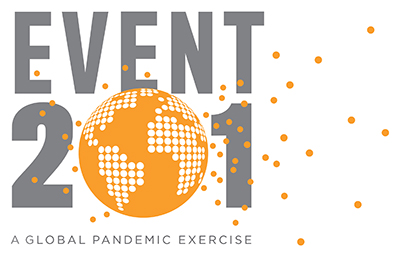Johns Hopkins Center for Health Security to host Event 201, a global pandemic exercise
Center News


August 21, 2019 – The Johns Hopkins Center for Health Security in partnership with the World Economic Forum and the Bill and Melinda Gates Foundation will host a global pandemic exercise called “Event 201” on Friday, October 18, 2019, in New York City.
The exercise will illustrate the pandemic preparedness efforts, response decisions, and cooperation required from global businesses, governments, and public health leaders that the world will need to diminish the large-scale economic and societal consequences of a severe pandemic.
In recent years, the world has seen a growing number of epidemic events—approximately 200 events annually. These events are increasing, and they are disruptive to health, the economy, and society. Managing these events strains global capacity, even absent a pandemic threat. Experts agree that it is only a matter of time before one of these epidemics becomes global—a pandemic with potentially catastrophic consequences. A severe pandemic, which becomes “Event 201,” would require reliable cooperation among several industries, national governments, and key international institutions.
15 global business, government, and public health leaders will be players in the 3.5-hour simulation exercise. Players will be presented with a pandemic scenario that highlights unresolved real-world policy and economic issues that could be solved with sufficient political will, financial investment, and attention now and in the future.
“We recognize that pandemics can have more than just health consequences, they can cause severe cascading economic and societal consequences,” said Eric Toner, MD, a senior associate at the Center and Event 201 project lead. “Neither the public sector nor the private sector alone can adequately respond to a severe pandemic; they must work together. That’s our goal for Event 201, and why an exercise of this kind is such a valuable and compelling way to help leaders understand the decisions needed to prevent, prepare for, and respond to biological threats.”
Recent economic studies show that pandemics will be the cause of an average annual economic loss of 0.7% of global GDP—or $570 billion. The players’ responses to the scenario will illuminate challenges to essential cooperation among industry, national governments, key international institutions, and civil society needed to avoid the catastrophic consequences that could arise from a pandemic of this nature.
“Outbreaks of infectious disease may be inevitable, but the economic damage they cause is not,” explained Ryan Morhard, the project lead for Global Health and Healthcare Industries at the World Economic Forum. “While most of the authority rests with the public sector, most of the resources and capabilities exist in the private sector. Sustained attention from a broad public-private coalition is needed in advance of a severe pandemic to minimize economic and societal consequences.”
Like the Center’s 3 previous exercises—Clade X, Dark Winter, and Atlantic Storm—Event 201 will educate senior leaders at the highest level of US and international governments and leaders in global industries.
Chris Elias, president of global development at the Gates Foundation noted that “Event 201 and its predecessor simulations like Clade X are crucial tools to understand not only what is needed to effectively respond to global public health crises, but also the consequences of what happens when we are not prepared.”
The exercise is supported by funding from the Open Philanthropy Project.
About the Johns Hopkins Center for Health Security:
The Johns Hopkins Center for Health Security works to protect people from epidemics and disasters and build resilient communities through innovative scholarship, engagement, and research that strengthens the organizations, systems, policies, and programs essential to preventing and responding to public health crises. The Center is part of the Johns Hopkins Bloomberg School of Public Health and is located in Baltimore, MD.
About the World Economic Forum:
As the International Organization for Public-Private Cooperation, the World Economic Forum is committed to managing risks associated with emerging infectious diseases of epidemic and pandemic potential through innovative, cross-industry, and cross sectoral public-private cooperation, strengthening national and global health security. Via the Forum’s Epidemics Readiness Accelerator, more than 100 stakeholders are addressing challenges associated with public-private cooperation relied upon for effective readiness. The 2019 Global Risk Report describes the transformation of biological risks, and the 2019 report, “Outbreak Readiness and Business Impact,” helps companies properly understand risks, enabling them to reduce their exposure, improve their resilience, and deliver on key opportunities for public-private cooperation to strengthen global health security.
About the Bill and Melinda Gates Foundation:
Guided by the belief that every life has equal value, the Bill & Melinda Gates Foundation works to help all people lead healthy, productive lives. In developing countries, it focuses on improving people’s health and giving them the chance to lift themselves out of hunger and extreme poverty. In the United States, it seeks to ensure that all people—especially those with the fewest resources—have access to the opportunities they need to succeed in school and life. Based in Seattle, Washington, the foundation is led by CEO Sue Desmond-Hellmann and Co-chair William H. Gates Sr., under the direction of Bill and Melinda Gates and Warren Buffett.
